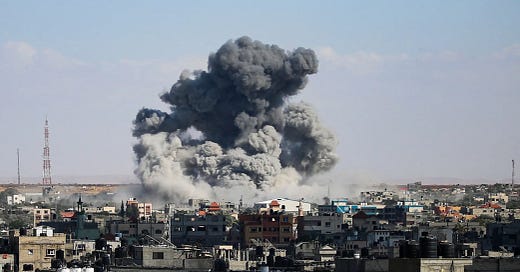
Israel's military machine grinds relentlessly forward in Gaza. Smoke-choked skies and the desperate cries of fleeing families paint a grim backdrop as over 100,000 palestinians desperately seek safety in Rafah. Overnight airstrikes have shattered homes and lives, leaving 20 dead and countless more wounded.
Evacuation orders echo through the chaos – text messages, calls and hastily-printed flyers in Arabic demanding civilians leave their homes for a so-called "humanitarian zone" miles away. But this sliver of land is already a sea of makeshift tents, overflowing with the displaced. Their numbers will now tragically swell.
Rafah, a crowded refuge for over a million people, has long been a ticking time bomb. Fears of a full-scale Israeli assault on Hamas strongholds here have now come to terrifying fruition. Ceasefire talks in Cairo have collapsed, and the U.S. warns of dire humanitarian consequences if Israel invades.
The Biden administration has reportedly blocked a shipment of U.S. ammunition to Israel – a signal of a potential policy change. Yet, Prime Minister Benjamin Netanyahu seems determined to escalate, hinting at a ground invasion of Rafah whether or not Hamas accepts ceasefire terms.
The world condemns these actions. In Northern Gaza, the UN's World Food Programme describes a "full-blown famine" spreading its deadly reach. Nearly every one of Rafah's 600,000 children bears the scars of this conflict – injured, malnourished, traumatized.
Protests rock Israeli cities, and the U.S. voice grows louder. Still, Israel marches on. Each tick of the clock brings more devastation to Gaza, more innocent lives crushed under the weight of war. There must be a ceasefire, there must be aid – or Gaza will become a graveyard of the forgotten.





